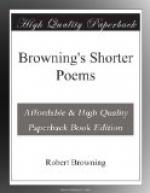XVII
What were seen? None knows, none ever will know.
180
Only this is sure—the sight were other,
Not the moon’s same side, born late in Florence,
Dying now impoverished here in London.
God be thanked, the meanest of his creatures
Boasts two soul-sides, one to face the world with,
One to show a woman when he loves her. deg.
deg.186
XVIII
This I say of me, but think of you, Love!
This to you—yourself my moon of poets!
Ah, but that’s the world’s side, there’s
the wonder,
Thus they see you, praise you, think they know you!
190
There, in turn I stand with them and praise you—
Out of my own self, I dare to phrase it.
But the best is when I glide from out them,
Cross a step or two of dubious twilight,
Come out on the other side, the novel
Silent silver lights and darks undreamed of,
Where I hush and bless myself with silence.
XIX
Oh, their Rafael of the dear Madonnas,
Oh, their Dante of the dread Inferno,
Wrote one song—and in my brain I sing it,
200
Drew one angel—borne, see, on my bosom!
* * * * *
NOTES
* * * * *
THE PIED PIPER OF HAMELIN. (PAGE 1.)
The poem is based on an old myth found in many forms, all turning upon the attempt to cheat a magician out of his promised reward. See Brewer’s Reader’s Handbook, Baring-Gould’s Curious Myths of the Middle Ages, Grimm’s Deutsche Sagen, and the Encyclopaedia Britannica. There are Persian and Chinese analogues.
The eldest son of William Macready, the actor, was confined to the house by illness, and Browning wrote this jeu d’esprit to amuse the boy and to give him a subject for illustrative drawings.
LINE 1. =Hamelin=. A town in Hanover, Prussia.
89. =Cham=, or Khan. The title of the rulers of Tartary.
91. =Nizam=. The title of the sovereign of Hyderabad, the principal state of India.
158. =Claret, Moselle=, etc. Names of wines.
179. =Caliph=. The title given to the successor of Mohammed, as head of the Moslem state, and defender of the faith. Century Dictionary.
TRAY. (PAGE 15.)
The poem tells in detail an actual incident, and was written as a protest against vivisection.
3. =Sir Olaf=. A conventional name in romances of mediaeval chivalry.
6. A satire upon Byronism. Manfred and Childe Harold are heroes of this type.




